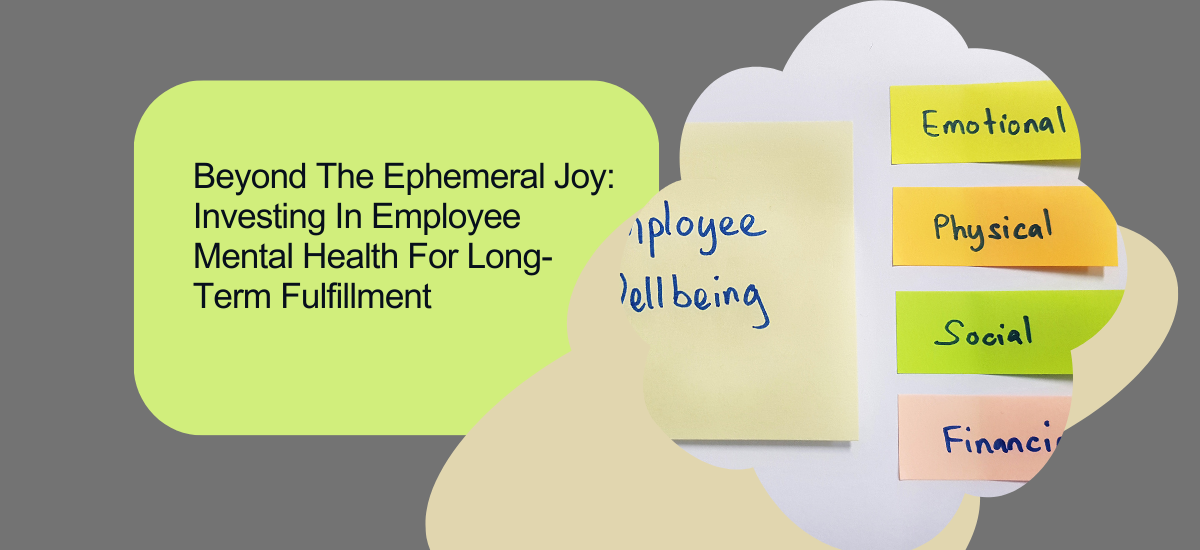Beyond The Ephemeral Joy: Investing In Employee Mental Health For Long-Term Fulfillment

Introduction
In the bustling corporate landscape of India, companies are continually seeking ways to enhance employee satisfaction and productivity. CareMe Health stands at the forefront of this pursuit, advocating for a shift from fleeting pleasures to enduring mental well-being. The hedonic treadmill theory suggests that the joy from salary hikes, team outings, and welcome gifts is short-lived. Hence, it’s crucial for companies to pivot towards fostering long-term happiness for their workforce. Here’s why and how.
Understanding the Hedonic Treadmill
The hedonic treadmill, a concept rooted in psychological studies, posits that people quickly return to a relatively stable level of happiness despite major positive or negative events or life changes. When applied to the workplace, this implies that the excitement from a bonus or a fun team event dissipates swiftly, leaving employees back where they started in terms of job satisfaction. Research indicates that such short-term incentives, although initially motivating, fail to yield sustained happiness or engagement.
The Long-Term Impact of Mental Health Investment
Mental health is the cornerstone of overall well-being, and its neglect can lead to a disengaged and unproductive workforce. A study by the World Health Organization found that for every USD $1 put into scaled-up treatment for common mental disorders, there is a return of USD $4 in improved health and productivity. Furthermore, a report by Assocham India highlighted that companies in India that invested in mental health programs witnessed a significant drop in absenteeism and a surge in employee retention.
Mental Health as a Strategic Investment
Mental health initiatives are more than just a moral imperative; they are a strategic investment. The American Psychiatric Association reports that employees with unresolved depression experience a 35% reduction in productivity. In contrast, proactive mental health programs can lead to a more resilient and thriving workforce. Employers who understand this invest in mental health not just to tick a box, but to enhance their company’s performance and culture.
CareMe Health’s Approach to Mental Wellness
CareMe Health’s comprehensive approach to mental wellness moves beyond conventional incentives. Our programs are meticulously designed to integrate into the daily lives of employees, providing them with tools and support for managing stress, anxiety, and other mental health challenges. From mindfulness workshops to one-on-one counseling, we’re committed to helping employees achieve a balanced and fulfilling professional life.
The Path to Sustainable Employee Happiness
To embark on the path to sustainable happiness, companies must adopt a holistic view of employee well-being. This means providing consistent support through initiatives like flexible work arrangements, mental health days, and access to mental health professionals. Integrating these practices into the company culture fosters an environment where employees feel valued and supported in the long term.
Getting Started with CareMe Health
For businesses ready to make a pivotal change in their approach to employee well-being, CareMe Health is the ideal partner. We invite you to take the first step towards a happier, healthier workplace by booking a demo with us. Book a demo to explore how our tailored mental health solutions can benefit your organization.
Conclusion
While occasional perks can spark temporary happiness, the key to sustained employee satisfaction and productivity lies in the mental health support you provide. Investing in mental health is not just a passing trend; it is a strategic move that will pave the way for a happier workforce and a stronger company. Partner with CareMe Health, and let’s build a future where mental well-being is at the heart of every organization.
Related Articles

Letting Go With Grace: Emotional Tools for Closure
Letting go is never easy. Whether we are parting ways with a loved one, ending a relationship, leaving a job, or saying goodbye to a cherished chapter of life, the emotional weight can feel overwhelming. Yet, closure is essential for our emotional well-being. Without it, we carry unresolved grief, anger, regret, or longing that can seep into new relationships and experiences, holding us back from healing and growth.

Breakup Blues: How to Cope and Rebuild Your Self-Worth
A breakup often feels like a silent earthquake—unseen by others but devastating within. The pain doesn’t just come from the loss of a relationship, but from the crumbling of the life, identity, and future you built with another person. You may find yourself questioning your worth, doubting your value, and feeling isolated even when surrounded by people. In Indian society, where emotional expression is often discouraged and breakups can be stigmatized, this pain may feel even more overwhelming. But the truth is—while breakups may shake you, they do not define you. You are not broken; you are in a process of emotional reformation. And with the right tools, guidance, and support system, you can rebuild not just your self-worth but also your entire life narrative.

Healing After Heartbreak: A Mental Health Perspective
Heartbreak doesn't just break your heart—it can shatter your sense of identity, peace, and purpose. Whether the end was expected or abrupt, mutual or one-sided, short-lived or long-term, the aftermath often leaves people emotionally disoriented. In Indian culture, where societal expectations and family involvement in romantic relationships are prevalent, the pain is not just personal—it is public. Yet, very few are taught how to heal from emotional loss in a healthy, sustainable way.

Boundaries in Love: Saying ‘No’ Without Guilt
Love, in its truest form, should be a safe space—a space where individuality is not only respected but celebrated. Yet, in many relationships, especially in the Indian cultural context, love is often misunderstood as constant availability, complete sacrifice, and putting the other person first, always. As noble as this may sound, this version of love often leads to emotional exhaustion, suppressed resentment, and the erosion of one’s identity.

Gaslighting in Relationships: What It Is and How to Heal
Gaslighting is a form of emotional abuse that erodes your ability to trust your own perception. It’s a slow, insidious process that often begins with subtle doubts and ends with complete self-questioning. In romantic relationships—especially in the Indian context where silence, compromise, and duty are often mistaken for love—gaslighting can be even harder to recognize.

How Depression Can Affect Your Relationship—And What You Can Do
Depression is not just an internal struggle—it ripples outward, affecting relationships, routines, and the emotional fabric that holds people together. When someone is dealing with depression, it's not only their world that becomes dim—it can cast a shadow over their most intimate connections too. In a country like India, where open conversations about mental health are still rare and love is often equated with endurance, depression within a relationship can become invisible, misunderstood, or misjudged.

